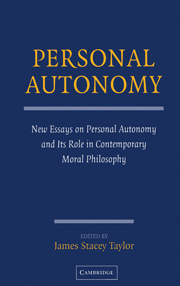Book contents
- Frontmatter
- Contents
- List of Contributors
- Acknowledgments
- Introduction
- PART I THEORETICAL APPROACHES TO PERSONAL AUTONOMY
- PART II AUTONOMY, FREEDOM, AND MORAL RESPONSIBILITY
- 8 Autonomy and Free Agency
- 9 The Relationship between Autonomous and Morally Responsible Agency
- 10 Alternative Possibilities, Personal Autonomy, and Moral Responsibility
- 11 Freedom within Reason
- PART III THE EXPANDING ROLE OF PERSONAL AUTONOMY
- Index
10 - Alternative Possibilities, Personal Autonomy, and Moral Responsibility
Published online by Cambridge University Press: 03 December 2009
- Frontmatter
- Contents
- List of Contributors
- Acknowledgments
- Introduction
- PART I THEORETICAL APPROACHES TO PERSONAL AUTONOMY
- PART II AUTONOMY, FREEDOM, AND MORAL RESPONSIBILITY
- 8 Autonomy and Free Agency
- 9 The Relationship between Autonomous and Morally Responsible Agency
- 10 Alternative Possibilities, Personal Autonomy, and Moral Responsibility
- 11 Freedom within Reason
- PART III THE EXPANDING ROLE OF PERSONAL AUTONOMY
- Index
Summary
INTRODUCTION
The Principle of Alternative Possibilities (PAP) – a person is morally responsible for performing an action only if she could have done otherwise – captures the pervasive outlook that to be morally responsible for one's conduct one must have had, at suitable junctures along the causal pathway to the conduct, alternative options. This principle has been the cynosure of interest in discussions on free will and moral responsibility because there are impressive reasons to think that determinism – the doctrine that, at any instant, there is exactly one physically possible future – rules out alternative possibilities and is, hence, if PAP is true, incompatible with responsibility.
It is plausible to assume that, if there is a requirement of alternative possibilities for responsibility, there must be an analogous requirement for personal autonomy, at least when the notion of being autonomous is identified, roughly, with that of being self-governing. For, intuitively, just as it is initially taxing to see how one's actions could reveal one's moral worth if one lacked the sort of control involving alternative possibilities over those actions, so it is hard to see how one could be self-directing in one's life if one did not have genuine options. In addition, libertarians have insisted with considerable plausibility that an agent is morally responsible for her behavior only if she is the ultimate source of her activity; she must initiate or originate her conduct.
- Type
- Chapter
- Information
- Personal AutonomyNew Essays on Personal Autonomy and its Role in Contemporary Moral Philosophy, pp. 235 - 257Publisher: Cambridge University PressPrint publication year: 2005
- 3
- Cited by



